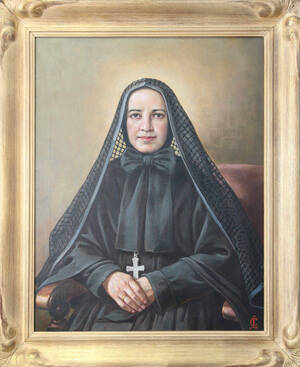I go to the movies about once every 18 months. I never seem to have time.
One Sunday in March, I went to see Cabrini. I knew (or at least I thought I knew) a lot about the life of Frances Xavier Cabrini, who founded the Missionary Sisters of the Sacred Heart of Jesus. Italians love her. She is the patron saint of immigrants. Herself an immigrant to the United States, she served many who came after her in the late 19th and early 20th centuries. Mother Cabrini and her religious community cared for them in every way — materially, socially, spiritually, emotionally. They built schools, hospitals, orphanages and more.
Born in 1850 in the Lombardy region of Italy when it was part of the Austrian Empire, she became a U.S. citizen — later becoming the first to be canonized by the Catholic Church.

But there is so much about her life that I did not know. Mother Cabrini often suffered from ill health, but it did not get in the way of her desire to serve the poor. I was moved by the depiction of the poverty and racism that Italians in New York faced. “Dumb guineas” and “dagos” were just some of the terms people used to describe them.
As I watched the movie, I thought a lot about my paternal grandparents who came to the United States from Sicily in 1912, less than 25 years after Mother Cabrini and her sisters arrived. I always knew that my grandparents were very poor. But I cried because of the discrimination that they must have faced. I just didn’t know about that. They never spoke about it.
The racism extended to every area of life — jobs, schools, hospitals. Mother Cabrini fought the state and the Church to care for the people. She stood up to popes and archbishops, mayors and bankers. She was, to use a phrase common here at Notre Dame, a force for good.
I did not know why the film was released on March 8, International Women’s Day, but it became quite clear. At the end of the movie, after she prevails in a conflict with the New York mayor, he says, “Mother, you should have been a man.”
“No, Mayor, men can never do what we do.”
Throughout the movie I could not stop thinking about the immigrants at our southern border seeking to enter the United States for the very reasons that my grandparents and so many others came here. The discrimination against immigrants from Latin America is omnipresent. I see and hear it everywhere. It is now, as it was then, sinful.
Each time that I am privileged to work at the Humanitarian Respite Center in McAllen, Texas — a service of Catholic Charities of the Diocese of Brownsville led by Sister Norma Pimentel, MJ — I see hundreds and hundreds of recently arrived immigrants, many of them children. The journeys that they describe, the suffering that they endure, are what I watched in Cabrini. Different port of entry, same story. Different ethnic group, same racism. Different language, same dehumanizing remarks.
Sister Norma and others like her are modern day Mother Cabrinis fighting for immigrants and refugees.
One thing that must particularly offend the heart of God is this: those who were once discriminated against all too easily become discriminators. We see this in the movie with the Archbishop of New York. He fiercely opposes Mother Cabrini and her work with the Italians. He is downright rude to her. At a moment of vulnerability, he tells her how he remembers his father telling stories of how his people faced terrible discrimination when they arrived in New York from Ireland.
It’s the same thing today. The very people who are so anti-immigrant often are themselves grandchildren and great-grandchildren of immigrants. How could their memory be so poor?
I truly believe that, as a country, we have lost our way, certainly our way of being hospitable and welcoming. And the only people who can help us find our way to becoming a nation of welcome and hospitality are immigrants.
At the final judgment Jesus will make reference to Matthew 25:31-46. He will ask, “How did you treat the stranger? Did you welcome the stranger?” We will be hard pressed, as a nation, to give an acceptable answer.
How should we be judged as a nation with regard to immigrants? The answer, I think is very sad.
When I returned to Dillon Hall after the watching Cabrini, the first thing that I did was sit down at the computer and buy a ticket to go to the movie again two days later. The next day I received an email from a nun friend of mine saying, “Every woman should see Cabrini once and every man twice.”
Lord, Jesus Christ, Son of the Living God, have mercy on me, a sinner.
Father Joe Corpora is associate director of the Transformational Leaders Program. He is a priest-in-residence at Dillon Hall and one of 700 priests whom Pope Francis appointed in 2016 to serve as Missionaries of Mercy. His most recent book about this latter experience is Doing Mercy: A Path to Contemplation.